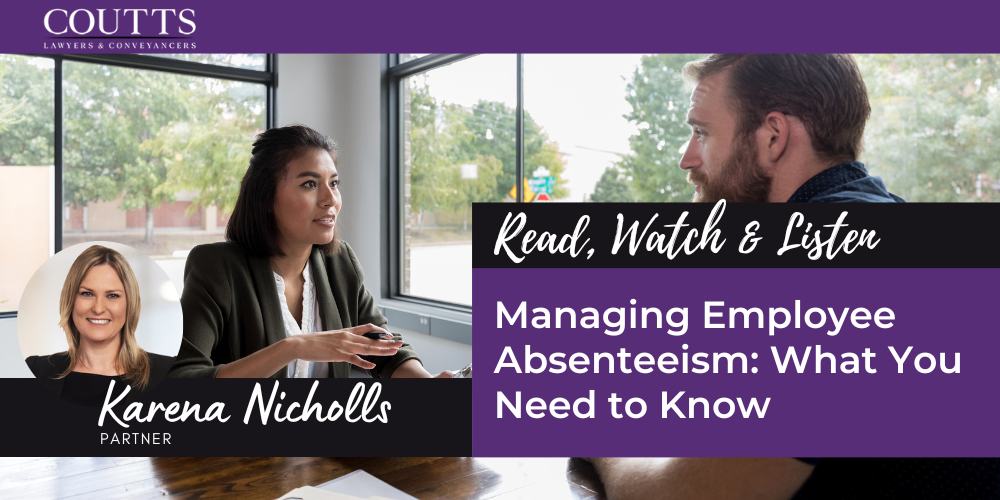KEY TAKE-OUTS:
As we head into a tough economy staff absenteeism can have significant impacts on your business. What can you do, what should you do and what can’t you do?
As an employer or manager, you need to ensure you manage your business efficiently. At the same time, you need to be able to discharge your legal and safety obligations effectively. To do this you must have full and correct information about an employee’s illness and limitations for work.
What is a medical certificate?
A medical certificate is documentary proof of illness from a registered medical practitioner stating that the employee will be/was unfit for work. It is generally regarded as proof an employee was legitimately absent from work because of the stated illness or injury.
Note: Without a certificate, an employee is not entitled to personal leave or compassionate leave.
When does an employee need a medical certificate?
A medical certificate is necessary for illnesses lasting more than two consecutive days. To ensure compliance, it’s essential to have a policy in place that clearly communicates this requirement to your staff.
Note: If you have a Policy you can add that any sick leave taken on a Monday or Friday can also require a doctor’s certificate.
Fair Work Act: Evidence Requirements for Sick Leave
Sections 97 and 107 of The Fair Work Act 2009 provide that if an employer requires it, an employee must provide evidence that would satisfy a reasonable person that sick leave is taken because the employee is not fit for work because of a personal illness or a personal injury.
An employee’s entitlement to take sick leave is contingent on them complying with the evidence requirements (vii). What constitutes “reasonable evidence” depends on the circumstances, however, a medical certificate or a statutory declaration should be accepted as appropriate evidence.
Best Practices for Managing Employee Illness and Absence
- Engage with the ill or injured person early and regularly
Ensure open and supportive communication without them considering you are harassing them.
- Watch for patterns of sick leave and address them head-on
Identify and monitor unsupported absences, particularly where there is a trend. Develop procedures for unacceptable absences.
- Incentivise staff to maintain health and wellbeing
Recognise and reward employees who don’t take sick leave in a quarter. Encourage overall health and wellness.
- Discuss fitness and safe work capabilities
Engage in discussions with the employee about their fitness level and determine what tasks they can safely perform. Liaise with their doctor or occupational therapist if necessary.
- Provide resources and counselling for a safe return to the workplace
Offer support, resources, and counselling to help the employee return to work in a timely, functional, and safe manner.
- Ensure employees are aware of workplace absence policies
Communicate and ensure understanding of your workplace policy on absence among all employees.
- Seek legal advice for prolonged absences
If an employee is absent from work for 3 months in a 12-month period, consult with legal professionals to determine the options and obligations regarding holding the role open.
- Consider implementing a wellness program
Create and implement a wellness program to promote overall employee health and combat sickness.
- Provide hygiene products for a healthy workplace
Equip the workplace with a range of hygiene products, such as tissues, soap, paper towels, disinfectant gels, and wipes, to prevent the transmission of COVID-19, cold, and flu.
- Ask relevant questions and ensure compliance with discrimination laws
Ask appropriate questions and gather necessary information to ensure there are no work, health, and safety issues. Remain mindful of not crossing any discrimination laws in the process. Section 30 below.
Disability Discrimination Act 1992 – Section 30
Requests for information
- This section applies in relation to a person (the first person) if, under Division 1 or this Division, it would be unlawful for the first person, in doing a particular act, to discriminate against another person on the ground of a disability of the other person.
- It is unlawful for the first person to request or require the other person to provide information (whether by completing a form or otherwise) if:
- The first person requests or requires the information in connection with, or for the purposes of, doing the act referred to in subsection(1); and
- Either or both of the following applies:
- Persons who do not have the disability would not be requested or required to provide the information in circumstances that are not materially different.
- The information relates to the disability.
- Subsection (2) does not apply if:
- Evidence is produced to the effect that none of the purposes for which the first person requested or required the information was the purpose of unlawfully discriminating against the other person on the ground of the disability; and
- The evidence is not rebutted.
Example: An employer may not require a prospective employee to provide genetic information if the employer intends to use that information to unlawfully discriminate against the employee on the ground of a disability of the employee.
However, the employer may require such information in order to determine if the prospective employee would be able to carry out the inherent requirements of the employment or to determine what reasonable adjustments to make for the employee.
- This section has effect subject to subsection 54A(5) (evidence that an animal is an assistance animal).
We are here for you
If you require a thorough health check of your business’s employment law practices, don’t hesitate to contact the experienced team at Coutts. Our experts can provide valuable insights and guidance to ensure compliance and effective management of employment-related matters. Reach out to us today for personalised assistance tailored to your specific needs.
ABOUT KARENA NICHOLLS:

Karena is a Partner at Coutts and is the Head of our Injury Compensation (with extensive knowledge in personal injury) and Employment Law teams. She is passionate and dedicated to helping her clients understand their rights and obligations and advising them on the best course of action to achieve their desired outcomes. It is her practical and client-orientated approach that has attributed to her authentic reputation positioning her as a highly regarded compensation and employment lawyer.
For further information please don’t hesitate to contact:
Karena Nicholls
Partner
info@couttslegal.com.au
1300 268 887
Contact our Employment Lawyers Today.
This blog is merely general and non-specific information on the subject matter and is not and should not be considered or relied on as legal advice. Coutts is not responsible for any cost, expense, loss or liability whatsoever to this blog, including all or any reliance on this blog or use or application of this blog by you.



